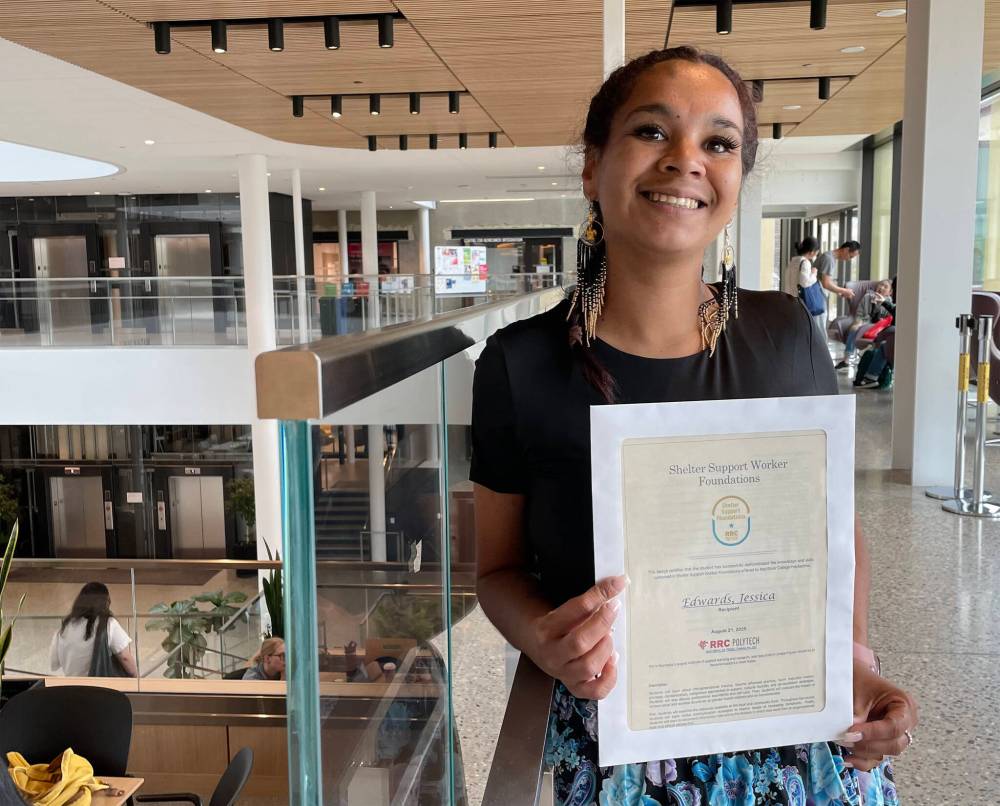Unique RRC Polytech course graduates 39 shelter support workers
Advertisement
Read this article for free:
or
Already have an account? Log in here »
To continue reading, please subscribe:
Monthly Digital Subscription
$1 per week for 24 weeks*
- Enjoy unlimited reading on winnipegfreepress.com
- Read the E-Edition, our digital replica newspaper
- Access News Break, our award-winning app
- Play interactive puzzles
*Billed as $4.00 plus GST every four weeks. After 24 weeks, price increases to the regular rate of $19.00 plus GST every four weeks. Offer available to new and qualified returning subscribers only. Cancel any time.
Monthly Digital Subscription
$4.75/week*
- Enjoy unlimited reading on winnipegfreepress.com
- Read the E-Edition, our digital replica newspaper
- Access News Break, our award-winning app
- Play interactive puzzles
*Billed as $19 plus GST every four weeks. Cancel any time.
To continue reading, please subscribe:
Add Winnipeg Free Press access to your Brandon Sun subscription for only
$1 for the first 4 weeks*
*$1 will be added to your next bill. After your 4 weeks access is complete your rate will increase by $0.00 a X percent off the regular rate.
Read unlimited articles for free today:
or
Already have an account? Log in here »
Red River College Polytech is celebrating its largest class of graduates from a one-of-a-kind course for shelter support workers.
Dozens gathered at Manitou a bi Bii daziigae (formerly known as the Innovation Centre Project) on RRC Polytechnic’s Exchange District campus to recognize the 39 students who earned a shelter support worker micro-credential this year.
“The work ahead is urgent. It will not always be easy, but you are ready,” Tsungai Muvingi Van Landeghem told the grads.

MAGGIE MACINTOSH / FREE PRESS
Jessica Edwards, a 38-year-old from Roseau River Anishinabe First Nation, says she wants to practise harm reduction and provide compassionate, culturally-sensitive care in shelters.
The provincial co-ordinator of the Manitoba Association of Women’s Shelters said both the students’ badges and their commitments “to shaping a safer, more just community” were worthy of celebration.
MAWS developed the six-month-long course in partnership with RRC Polytech and Women and Gender Equity Manitoba. There have been 85 graduates since it launched in 2023.
Jessica Edwards, 38, said she enrolled in the hopes of providing others with the same compassionate, non-judgmental and life-changing care she’s received in the shelter system.
“You come into the shelter so raw and so vulnerable, and the non-judgment and the warm-welcoming and accommodations — the shelter staff made it easy to ask for things — (have stuck with me),” Edwards said.
She recalled experiencing intimate-partner violence for the first time in 2006, shortly after she transitioned out of foster care. The mother of two has sought refuge at a handful of emergency facilities in Winnipeg, Selkirk and Steinbach.
One of the highlights in the RRC Polytech program is the ability for students to share their diverse lived experiences with each other during virtual meetings, she said.
The tuition-free program, which is delivered remotely in a part-time capacity, is funded through the provincial and federal governments as part of the National Action Plan to End Gender-based Violence.
It was designed to grow the workforce and equip future employees with a trauma-informed lens to use in supporting clients at homeless and family violence shelters.
Staff shortages are “the unfortunate norm” in the sector, said Nadine Smith of Women and Gender Equity Manitoba.
Smith indicated that about half of all students are entering the program with work experience in a shelter.
A 20-hour practicum is built into the program so students who’ve never worked in a shelter are exposed to the environment and can build their resumés.
Students learn key shelter terminology and how to set professional boundaries with clients, among other lessons.
This year’s final projects explored topics ranging from the particular challenges of serving seniors to working with clients in hotels.
Edwards, who is a member of Roseau River Anishinaabe First Nation, said she’s leaving the program feeling far more confident in her skills than when she began.
“I’ve been the client but, as humans, we all have our doubts about our capabilities,” she said after Thursday’s convocation.
The program accepts students from all over Manitoba.
maggie.macintosh@freepress.mb.ca

Maggie Macintosh
Education reporter
Maggie Macintosh reports on education for the Free Press. Originally from Hamilton, Ont., she first reported for the Free Press in 2017. Read more about Maggie.
Funding for the Free Press education reporter comes from the Government of Canada through the Local Journalism Initiative.
Every piece of reporting Maggie produces is reviewed by an editing team before it is posted online or published in print — part of the Free Press‘s tradition, since 1872, of producing reliable independent journalism. Read more about Free Press’s history and mandate, and learn how our newsroom operates.
Our newsroom depends on a growing audience of readers to power our journalism. If you are not a paid reader, please consider becoming a subscriber.
Our newsroom depends on its audience of readers to power our journalism. Thank you for your support.
History
Updated on Thursday, August 21, 2025 5:08 PM CDT: Adds photo

